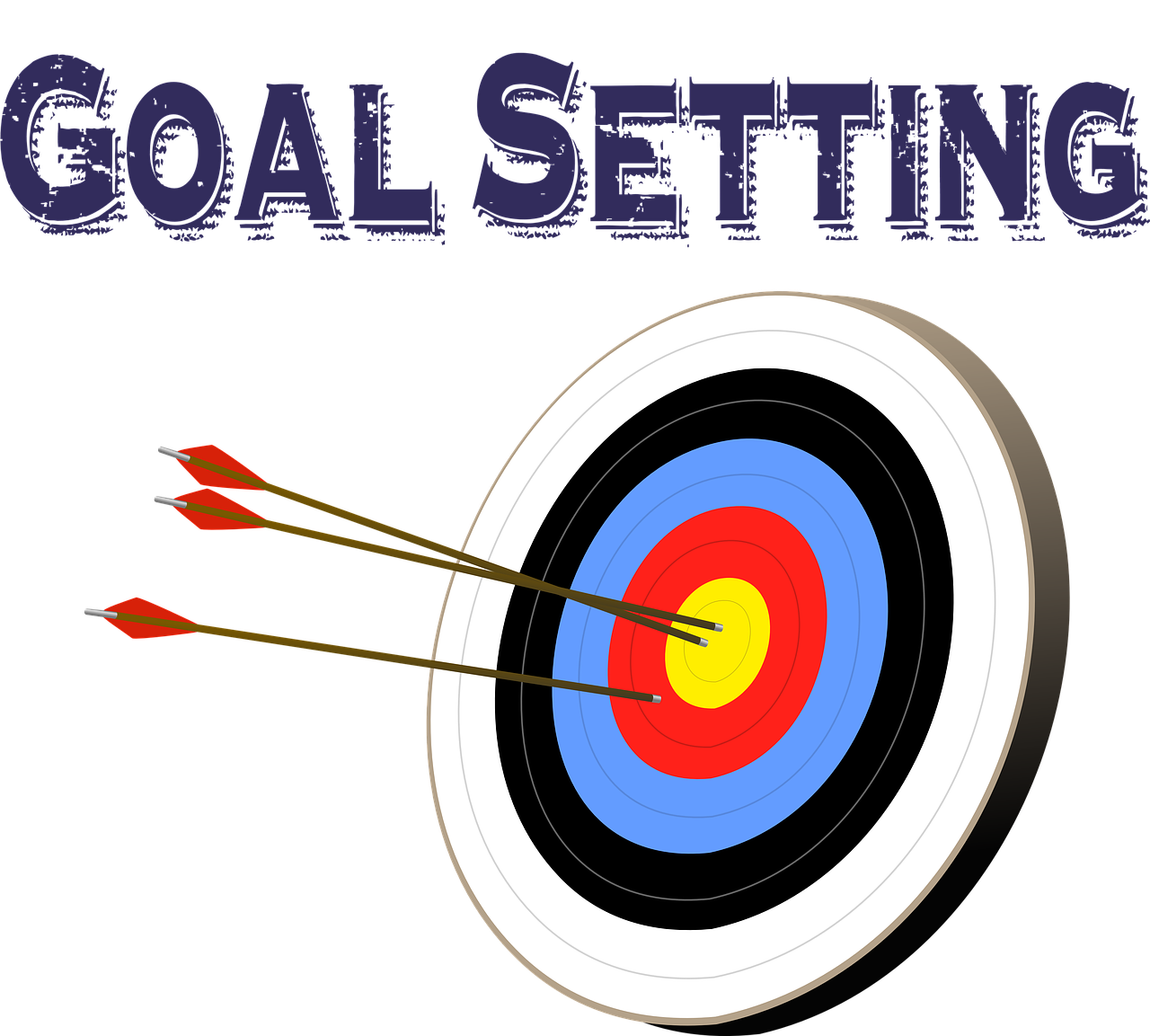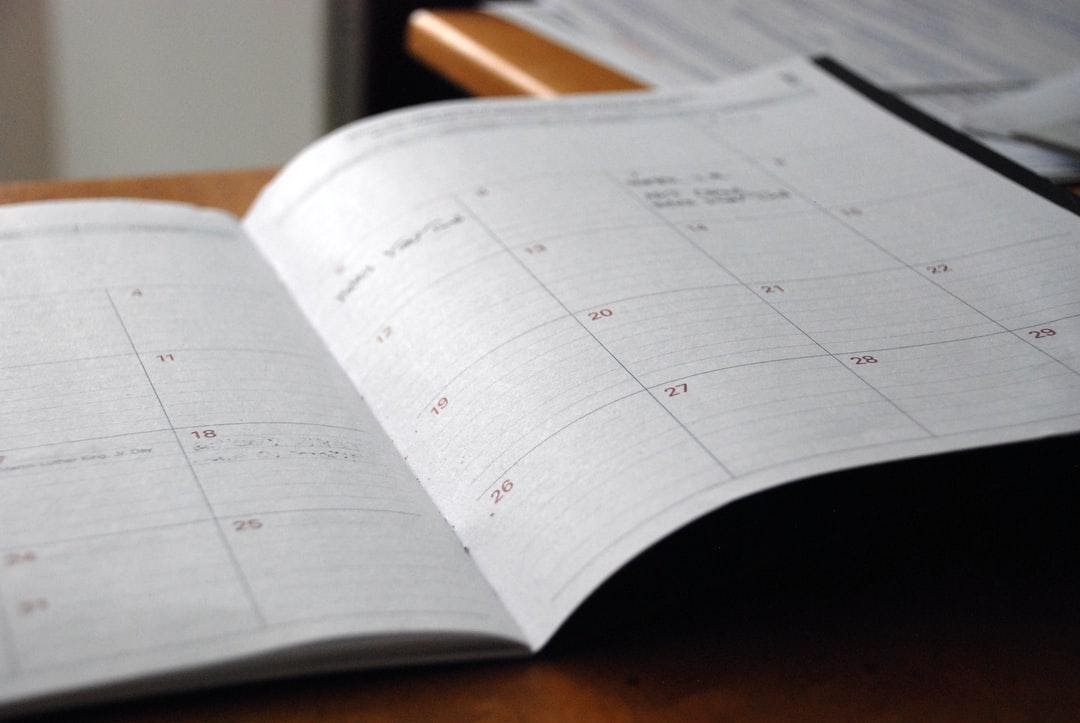Are you wondering how to be more productive at work? You’re not alone. From individuals to corporations to countries, everyone wants to measure and improve productivity. Each year, there are countless studies performed by different organizations, all aimed at evaluating productivity.
Oddly enough, we’re more productive than ever. The net productivity of the American worker has increased by 253% in the last 70 years. But we’re constantly looking for ways to improve, to do more still.
And you can!
Table of Contents
- What success looks like: 5 letters, SMARTer goals
- How to achieve a productive mindset: 4 qualities to cultivate
- How to be more productive at work: 20 tricks and tips
Ready to do more business with email marketing?
Start your free 60-day trial today. Learn more about our 60-day free email marketing trial.
What success looks like: 5 letters, SMARTer goals

Make sure that your goals are SMART: specific, measurable, achievable, realistic, and time-based. Image by: ArtsyBee via pixabay.com
The old adage is true: Work smarter, not harder.
Part of working smarter is setting SMART goals. How can you evaluate your success if you don’t know what you’re trying to achieve?
Take a moment to imagine the future you want. Where are you in five or ten years? Think about all aspects of your life, but focus on the role that your career plays in the big picture.
Revisit this image frequently. Visualization has a proven record of helping everyone from athletes to CEOs.
Once you have your ultimate destination in mind, it’s time to chart your path. Back that dream up until you find a waystation closer to where you are. What do you need to accomplish here in order to get there? Set yourself objectives that move you in the right direction.
To give yourself your best chance at success, craft SMART goals. SMART goals are:
- Specific
- Measurable
- Achievable
- Realistic
- Time-based
As you draw up your list of goals, refer to the acronym to evaluate each aspect. For example, is your goal specific enough? You have a better chance of losing ten pounds than of “losing weight,” and the same principle applies in business.
Bring SMARTs to all your business objectives. Set email marketing goals, manufacturing or production goals, sales goals, etc. Then congratulate yourself as you start racking up the wins.
How to achieve a productive mindset: 4 qualities to cultivate
It isn’t enough to have a clear vision — or even to have clearly identified goals. There are other components to a highly productive mindset.
Motivation
Maybe it’s your children. Maybe it’s your dream or your mission. Why do you work hard? Why do you want to be productive?
Keep some reminder of your ultimate “Why” on hand. You’ll want to be able to revisit it when things get tough.
Mindfulness
You can have all the will in the world when it comes to achieving your goals. Unless you stay present and aware, in the moment, you’ll still wind up wasting time and wondering why you can’t learn how to be more productive at work.
Continually check in on yourself. Is a task taking longer than it should? Are you losing time to distractions?
Be mindful about starting and stopping work as well as the work itself. Give yourself time off the clock — and treat it as time off rather than time slacking.
Persistence
Setbacks are inevitable. They don’t need to derail your dreams.
If you want to be productive, keep going. Even when you don’t want to. Even when it’s hard. Even when the universe screws up your perfectly good plans with catastrophe. Sooner or later you’ll come out on the other side.
Positivity
Persistence is both harder and less valuable without positivity. Unless you believe in yourself, it’s all but impossible to keep moving in the right direction and at your best speed.
At the end of each day, don’t stress over all the things you could have done better. How are you supposed to attain your personal best when you’re down from beating yourself up? Instead, meditate on everything you did right and everything for which you’re thankful.
Identify points of failure and use them to improve, but reinforce good behavior and build your confidence by focusing on the positives.
How to be more productive at work: 20 tricks and tips
You’ve figured out where you’re going, charted your path there, and put yourself in the right frame of mind. It’s time to strategize. How can you become the most effective version of yourself?
Success takes sweat equity. There’s no way around the extra days and hours of work. But it’s important to make better use of your designated workdays.
Some of the following are simple tips, and others are actually full philosophies to adopt. All of them come with expert endorsements.
Practice both of the two-minute rules
People often talk about the two-minute rule when discussing how to be more productive at work. It took me ages to figure out that there are two two-minute rules, both of which can help you become a more effective person. No wonder I was confused.
1. Do it now
Popularized by David Allen, author of Getting Things Done, this two-minute rule says:
If you determine an action can be done in two minutes, you actually should do it right then and there. It will take longer to organize it and review it than it would be to actually finish it the first time you notice it.
In other words, don’t procrastinate — particularly when the task is easy and quickly completed.
Practice this two-minute rule when:
- You go through email, and you find one that requires a single-sentence reply.
- You realize the printer is out of toner, and you need to request more.
- You notice that your desk drawer has gotten cluttered, and it’s time to throw a couple of things away.
However, the two-minute rule is often misunderstood. It does not mean that you should make yourself available to any distraction so long as it will take less than two minutes to complete.
Don’t let minutiae pull you out of deep work. But don’t let the small stuff linger and clutter your world either.
2. Make the first step the goal
James Clear, another productivity pro and author of Atomic Habits, came up with this two-minute rule to help you develop good habits:
When you start a new habit, it should take less than two minutes to do.
Scale down your goals into two-minute versions that don’t intimidate you and that you can easily complete. Want to be a novelist? Aim to write for two minutes every day.
But that’s ridiculous. At that rate, it will take you five years to finish your first chapter.
Except you’ll probably start to write for much longer than for two minutes as you get more and more comfortable. According to Clear, the idea is to “master the art of showing up” and “reinforce the identity you want to build.”
If you want to be a writer, you need to write. And as anyone who has ever stared at a white screen with a blinking cursor can tell you, that first sentence — that first step — is the hardest part.
There’s nothing wrong with easy wins. Many of us would love to learn a certain skill or finish a certain project. But the larger goal scares us off or makes us feel tired.
So lower the bar. Then lower it some more. Then set it on the ground where you can roll over it.
Still skeptical? Give it a try. You can spare two minutes.
Be healthy
I know, I know. You’re looking for ways to be productive at work. You don’t want another lecture on the importance of long walks and fish oil.
But your health matters — to your job as well as everything else. Healthy habits, minds, and bodies get you ready for the workday and see you through it.
On the other hand, poor health — both physical and mental — contributes to as much as 93% of the problems that affect productivity. For many of these, health is a secondary, indirect cause, but still… 93%.
3. Eat the right foods.

A healthy diet helps you get the most out of each day. Image by: Anna Pelzer via unsplach.com
Good news! Coffee really is good for the brain, and that morning cup helps you have the most productive morning that you can.
But when it comes to food, your best bet is a healthy and balanced diet that keeps you awake and alert. If you find yourself crashing during the day, you may want to rethink your daily meals.
If you’re looking for a little extra power, here’s a partial list of foods that help you to be more productive:
- Blueberries
- Strawberries
- Avocado
- Kale
- Spinach
- Almonds
- Sunflower seeds
- Greek yogurt
- Tuna
And don’t forget to have breakfast with your morning caffeine. It helps stabilize your blood sugar and gives you energy to keep going throughout the day.
4. Exercise
Physical activity can help keep your body healthy, which already puts it on the list of one of the ways to be more productive at work. But exercise is also good for your brain, enhancing your memory and ability to process information.
Even a short workout increases the oxygen to your brain, stimulates the production of hormones that encourage cell growth, and decreases stress hormones.
Can’t make it to the gym? Try other ways of incorporating exercise into your day. You might:
- Walk around the office
- Bike to work
- Sit on an exercise ball
- Adopt a standing desk
- Get up to stretch at regular intervals

Sneak some exercise into your day by taking the stairs. Image by: Lindsay Henwood via unsplash.com
Not all of these are aerobic, but they’ll still help you keep both your mind and body limber as you find how to be more productive at work.
Even deliberately parking far away and taking the stairs can give you a needed brain-boost.
5. Take care of both yourself and others
There has been a lot of research on the ways that mental health impacts workplace productivity. The relationship between the two is also circular. When you feel bad about your performance at work or about your workplace environment, mental health declines.
Practice self-care, and be proactive about voicing concerns if something or someone is negatively impacting you. There are often accommodations that can be made. And, most people are good-intentioned and only need a little direction in how you prefer to be treated.
Caring goes both ways, of course. Make sure that you’re doing everything in your power to foster a positive environment that respects other people and provides for their comfort.
6. Get enough sleep
You know those people who claim they only need four hours of sleep and scoff at us lesser mortals?
For one thing, a lot of them are lying. Some exaggerate, and others delude themselves. Have they tried getting more sleep? Were they happier, healthier, and more productive? Are they sure?
For another thing, people have different sleep needs. There are even identified genes that affect natural cycles and alertness. And these four-hour folks are the exception, not the rule.
Research on sleep and job performance has identified a clear relationship between the two: better sleepers make better workers.
The vast majority of us need seven to nine hours of sleep. Those hours allow us to make the most of the other fifteen to seventeen hours in a day. People who sleep more wake up ready to do more.
On the other hand, poor sleep leads to a number of work-related problems, including:
- Inefficiency
- Counterproductive or antisocial behavior
- Workplace accidents
- Absenteeism
- Compromised career satisfaction and progression
Plus you’ll be a happier and more pleasant individual. Everybody wins!
Prioritize important projects and tasks
Productive people don’t just get a lot done — they get the right things done. They channel their time and energy into the work that will pay off the most, rather than dissipating it across the distractions that get in the way.
But how can you tell what the right things are? It’s easy to lose sight of end goals in the constant inflow of work that hits your desk. Too often, these incursions seem to scream to be done immediately.
The following tools will help you evaluate your to-do list and figure out what you really need to do today, tomorrow, and sometime next year.
7. Use the Eisenhower Matrix
Do people constantly dump “emergencies” in your lap, preventing you from moving valuable projects forward? Do you think you know how to be more productive at work but find yourself busy with things that don’t matter?
You may be suffering from the “mere urgency effect,” the name researchers have given our tendency to prioritize time-sensitive tasks over the projects crucial to long-term success.
So take a note from former president Dwight D. Eisenhower, who made a famous distinction between “urgent problems” and “important problems.” Or from Stephen Covey who codified that distinction into the Eisenhower Matrix in his book The 7 Habits of Highly Effective People.
The Eisenhower Matrix is a four-quadrant matrix. At the top, write the word “Important.” On the left, write the word “Urgent.” You should wind up with four boxes:
- Important, Urgent
- Important, Not Urgent
- Not Important, Urgent
- Not Important, Not Urgent
Now sort your to-do list into the four boxes.
If something is both important and urgent, do it as soon as possible. These items carry clear consequences and need to be handled at the highest level — whether that means writing up a contract for your client or heading to the emergency room to meet your kid who just broke their leg.
If something is important but not urgent, make plans. Find a place to fit this work into your schedule. Do you need to schedule your annual physical? Or move forward on a project without a clear deadline? Don’t let important goals get lost to the craziness of everyday life.
If something is urgent but not important, delegate it if possible. There may be someone else who can do it as well or better — and can’t do the high-level work that truly requires your time.
If something is neither urgent nor important… you don’t need to do it. Nobody needs to do it. Delete it altogether.
8. Use the 80-20 rule
The 80-20 rule — also known as the Pareto Principle — says that 80% of the outcomes come from only 20% of the causes.
Your workload probably includes a variety of work. Once you include career-important networking and more long-term thinking, that load only increases.
Stop and think about all that you have to do. Assume that the 80-20 rule is accurate and that only 20% of your work is responsible for 80% of the gains you want to achieve. What goes into that 20%? Let your answer guide your priorities.
Note that this doesn’t mean that the other 80% of your job isn’t important. It is — much of it is absolutely vital to the day-to-day operations of your company.
But that crucial 20% often lies in more important and less urgent to-dos. The 80-20 rule can help you to tell the difference and to make sure that important aspects of your work receive the attention they deserve.
Manage your time
Time management is one of those soft skills that every employer wants to see. Productivity is all about doing the most that you can with finite resources, such as your time.
Good time management leads to:
- Less stress
- More free time
- More opportunities
- Greater achievements
To be brief, your time is valuable. Spend it wisely.
10. Plan
Planning is crucial to success. One of the most amazing ways to be productive at work is also one of the easiest: your calendar. Regularly update your schedule, inputting both one-time and recurring commitments.

Not all productivity tools are high-tech. One of the best is a simple calendar. Image by: Eric Rothermel via unsplash.com
A rigorous schedule will give you a sense of the hard limits and outline of your day and week, enabling you to make better decisions as new possibilities arise.
Each morning, you can fill in the empty spaces. Think about what you have to get done and when you intend to accomplish it. Sometimes it’s enough to mark off blocks in the day devoted to a given project.
It’s also important to schedule social media and blog posts. If you leave them until you have both the time and the inclination, they’ll often go undone, and you’ll miss valuable marketing opportunities.
11. Track your day
Reflect when you’re done with the day. Did you follow your schedule? If not, why not? How long did tasks take, and how can you use that information going forward?
In order to teach yourself how to be more productive at work, you need a concrete idea of what and when you’re producing each day. Get a sense of how you really spend your time with any of the following:
- A manual log of when you start and stop individual tasks
- A spreadsheet where you record each time you stop and start work
- Your phone’s daily and weekly usage statistics
- An app that will passively track your time such as RescueTime
12. Set time limits
There are a lot of chores and projects that can expand to fit any amount of time. When you don’t have a clear time budget, it’s easy to wander down research rabbit holes or give a task half your attention for twice as long.
Don’t devote more time to something than it deserves. Budget your time, and use alerts to stay on track.
13. Say no
It isn’t a dirty word. You can’t do everything. People won’t hate you.
Most of us need to say no more often in our lives, but we fear disappointing others or missing out. Before you say yes:
- Ask yourself whether the new commitment aligns with your priorities. Is this important to you — either directly or indirectly? Does it add enough value to be worth the cost?
- Ask yourself whether you really have the time. Keep your calendar and to-do list in front of you. Can you fit whatever you’re considering into that map? Are you leaving yourself time to breathe?
Manage your energy
While time management is an old standby in conversations about how to be more productive at work, you need to manage your energy just as carefully. Even if you were able to calculate the maximum possible output for each hour of your day, you’d run out of energy before getting to lunch.
Your energy is a finite resource. Instead of fantasizing about a world in which you’re superhuman, accommodate your humanity with these tips.
14. Work with your natural rhythms
If you’re not a morning person, stop telling yourself that you can become one. If your brain slows down after three or four in the afternoon, don’t save your hardest tasks for the end of the day.
Know yourself, and plan for both your peaks and your lulls.
15. Take breaks to recharge
Believe it or not, it’s okay to pause and watch that ridiculous three-minute video your best friend sent you. Or to get up and go visit a friend in the office downstairs for a few minutes. Or to take yourself to the lobby coffee cart for a mid-morning mocha.
Rest your brain periodically and for short periods of time. It’ll keep you fresher and more productive over the long haul.
16. Automate what you can
Don’t waste your time and energy with busy work, especially not when there are tools that can handle these tasks for you.
- Set up your personal email folders, and sort or filter communications that you don’t need.
- Send automated email series to clients.
- Allow accepted invitations and group tools to update your calendar for you.
- Use social media monitoring tools to stay on top of your accounts.
Focus
Focus. I know. As if it’s that easy. Life is chaotic and messy. You need to find ways to be productive at work despite the madness.
17. Don’t multitask
It isn’t possible. Not really.
About 2.5% of the population can multitask effectively. For the rest of us, juggling and task-switching make us less efficient and more prone to mistakes.
Perhaps more alarming? Multitasking can actually impair your cognitive processes, reducing your ability to focus and to sort relevant from irrelevant information.
18. Reduce distractions
Maybe you need to bring headphones into the office. Or maybe you need to reorient your desk to face away from your friends. Refine your environment to best accommodate work.
One of the biggest distractions for most of us is the constant buzz of activity humming from our phones. If you’re prone to checking every notification or find yourself losing time to your devices, find ways of neutralizing them.
There are several ways of making your phone less distracting:
- Turn off notifications.
- Set your phone to grayscale.
- Download Flipd or another app with a feature that locks your phone for periods of time.

Do you waste time on the phone? Turn off your notifications. Image by: Bruce Mars via unsplash.com
Organize your world
When your calendar, workspace, and projects are scattered, it’s hard to figure out how to be more productive at work. The less you have to worry about sorting through the mess, the more energy you have for more important things.
19. Clean up and personalize your space
That old adage that the hardest workers have the messiest desks? Rarely true. Most of us work harder when we don’t have to search for the right document or tune out lots of little things in our workspace.
Tidy up both your desk and your computer. Empty out the trash, and collect loose documents into folders. Ensure that anything that you use frequently is easy to access and employ.
That said, a little bit of clutter isn’t actually a bad thing. Personalizing your workspace encourages a sense of ownership and responsibility.
20. Find the right tools for you
It seems like there’s an app for everything these days, from something as specific as creating a Facebook ad to all-encompassing planners and project management systems.
There are resources available. Take a moment to look into them and find the best tools for your needs.
But be careful: the wealth of options can backfire on you. You can get lost in the research or move around between platforms and products without taking full advantage of any of them.
Before you know it, the tools that were supposed to simplify your life have become a new source of stress. Where did you file that report from Elise or Tuesday’s meeting notes?
Limit your toolkit to the essentials, and be deliberate with which tools you use for which material.
Keep up with the latest business and marketing tips
The world changes quickly. So, find the best strategies and technologies to help you conquer it.
As for today? Now that you’ve learned how to be more productive at work, you might want to go forth and conquer the world. But focus your energy. Look back over this list and pick one of the 20 tips to implement first. Start there.
After all, it’ll only take you two minutes.
Business & Finance Articles on Business 2 Community
(62)
Report Post




